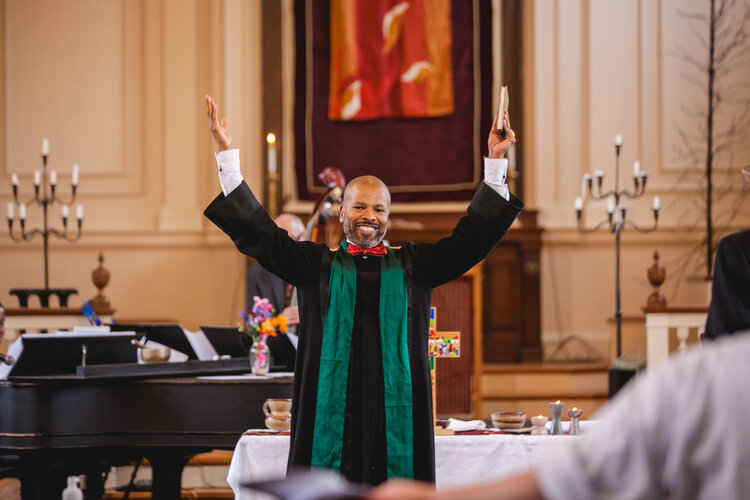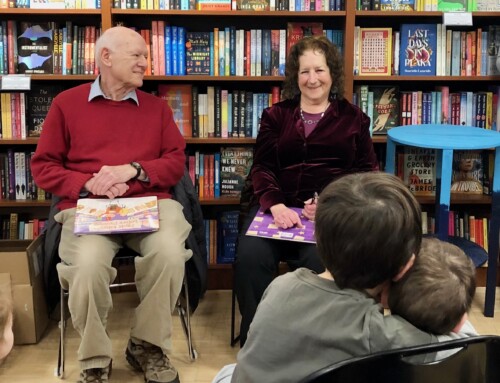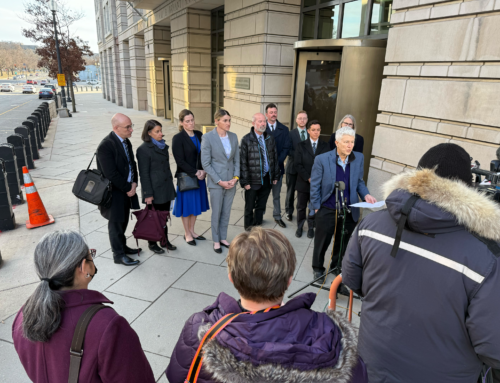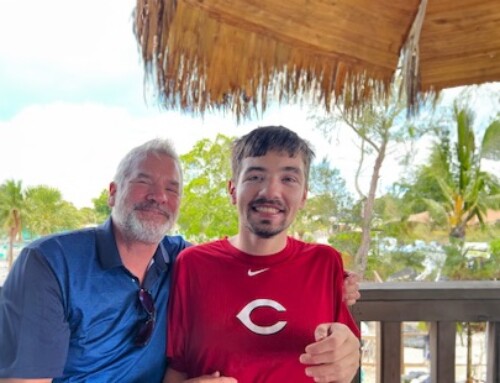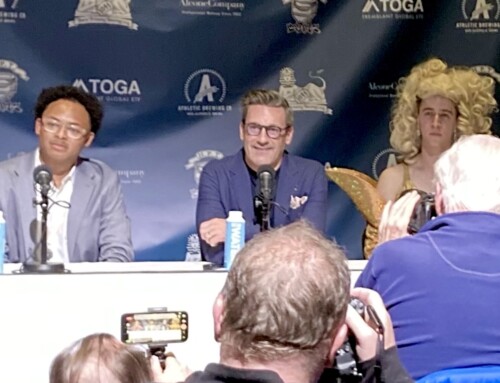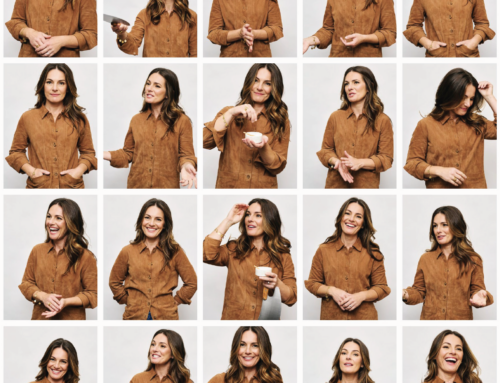AT THE HEIGHT OF FOOD APARTHEID BENJAMIN PERKINS SHARES HIS THOUGHTS
This past December, Benjamin Perkins was named CEO of Wholesome Wave, a national nonprofit founded in 2007 by James Beard Award-winning Chef Michel Nischan and former U.S. Undersecretary of Agriculture Gus Schumacher. Its mission is to empower under-served consumers to make healthier food choices by increasing affordable access to healthy fruits and vegetables. Based in Bridgeport, Connecticut, the nonprofit has developed such innovative programs as “Wholesome Rx” (doctors writing prescriptions for produce) and “SNAP Doubling” (2-for-1 produce at grocery stores and farmers markets).
Can you describe your role at Wholesome Wave?
I’m the CEO, which means I’m responsible for leading the organization.
What would you like to see happen in your new role as CEO?
I would love to expand and deepen the scale and impact of our work.
What do you want the public to know about Wholesome Wave? What is your message?
That we’re not a hunger-relief organization in the classic sense of that term. Rather, we believe that nutritious food is a human right, or as Wholesome Wave’s co-founder and chairman Michel Nischan likes to say, “It’s not about providing more food, it’s about providing nutritious food.”
Our message is, simply put, rooted in human dignity.
You hold two master’s degrees (Divinity and Clinical Psychology) and a bachelor’s (geography). What do these tell us about you? How do you integrate them into the business world?
They tell you that I love school! But seriously, I love to learn, and my educational (and life) journey has reflected my desire to understand the physical, emotional and spiritual worlds. I am thoroughly multidisciplinary in my approach to understanding the world and problem-solving.
Does your spirituality provide a foundation from which your professional pursuits flourish?
Absolutely. My spirituality, which is very this-worldly, is grounded in my belief that we must do everything at our disposal to create heaven on earth, and I see public health as a tool to do just that.
Are you ministering at any church? If so where? How and why have you pursued a spiritual path, not just academically and professionally but personally?
I am a community minister at Hope Central Congregational Church in the Jamaica Plain neighborhood of Boston.
I was raised in the Black church, which is a big part of my spiritual imprinting. My grandfather, father and uncles were deacons in the Baptist church, and I think I inherited a fascination with religion and spirituality.
When you couple this with my coming-out journey as a gay man, a journey that involved wrestling with my faith, I cannot think of a time when my spirituality hasn’t played some role in my life. Ultimately, my path represents a desire to live a life of meaning derived from helping to create a more humane, loving, just world.
Has Wholesome Wave had an impact on your food choices?
Great question! Not in a significant way, as I was a foodie before I donned Wholesome Wave’s doors. With that said, I do appreciate that we’re an organization that is not interested in the “thou shall not eats” approach to healthy eating. Rather our approach is about encouraging the addition of fruits and vegetables, which has positive health impacts. It’s a subtle but essential distinction—don’t prohibit, encourage!
Your work as VP of Health Strategies at the American Heart Association/American Stroke Association and now CEO of a nonprofit whose goal it is to get healthy food into the hands of underserved communities both seem to have a common thread. Can you elaborate on what motivates you to want to see a healthier society?
At 56, I am the oldest living male on my father’s side of the family. My father died of cardiovascular disease at 56, his youngest brother, my Uncle Willie, at 57, also from cardiovascular disease; his next brother, my Uncle Roy, at 65, from diabetes complications from heart disease.
Now that I’m the same age as my father was when he died suddenly, it gives me a tremendous amount of perspective, and resolve. I want to do everything I can to ensure that others don’t experience the premature losses that I’ve experienced, and I’m acutely aware that Black men have some of the worst health outcomes.
Can you tell us the highlights of your career? What was the most challenging? The most gratifying?
Highlights: Becoming CEO of Wholesome Wave feels like a “Everest moment!” Other things that come to mind include becoming an ordained minister in 2015; leading Project SOS at the Fenway Institute at Fenway Health; joining the American Heart Association as the Vice President of Health Equity and Multicultural Initiatives.
Challenges: My new role will easily be the most challenging because there are so many moving parts to running an organization.
Most gratifying: I see all my work in HIV/AIDS as part of a broader success story that resulted in significant reductions in new infections.
Your travels and experiences along with a new-found mission for addressing nutrition insecurity among the economically challenged across the nation, especially during the pandemic ordeal, poses a level of awareness and tremendous demand. How do you predict changes down the road for Wholesome Wave?
Food-and-nutrition insecurity are now top-of-mind issues and give Wholesome Wave an opportunity to amplify its work. Social problems of this magnitude require multiple sectors and stakeholders if we’re serious about transformation. I see Wholesome Wave’s work as a catalyzer and convener, leveraging our expertise and resources to achieve our mission of ending nutrition insecurity.
What about food deserts? Does Wholesome Wave address that problem and how?
I’m not a big fan of the term “food deserts” because it doesn’t capture the reality of how underserved communities become deserts. Food deserts often exist because of a confluence of issues: structural racism and the effects of redlining, urban renewal, disinvestment and the like. With this in mind, many people now use the term “food apartheid” to reflect this history.
In terms of Wholesome Wave’s approach, we continue to work in those communities that are often labeled food deserts with an understanding of those root-cause factors. Consequently, our programs and partners continue to evolve to incorporate a more comprehensive understanding of how best to serve vulnerable communities. A simple example is how we get nutritious food to our consumers—one size does not fit all, and so we may use a gift card, a delivery service or a food voucher. It all depends on what’s most effective.
Do you think people will choose fruits and vegetables if given the option?
What we have come to understand is that when folks have the opportunity to access healthy fruit, they take advantage. Most people want to lead healthy lives.
Looking at it more broadly, the pandemic has highlighted some major weakness in the U.S. food system. What do you believe are its three greatest flaws and do you think we’ll ever be able to eliminate them?
It’s difficult for me to stay definitively that these are the three most significant flaws, but I can say that these are a couple that I’ve identified in my survey of experts on the subject:
COVID-19 has exacerbated inequities to food and nutrition access that existed before the pandemic. That is, Black, Latinx, rural and other poor communities have seen rates of hunger skyrocket because lack of access was already a significant factor before the pandemic. Another issue is the plight of factory and farm workers, who play a key role in our food supply chain, yet are often working in conditions that make it difficult or impossible to practice social distancing, thereby making them vulnerable to COVID-19 infection and transmission. Moreover, substandard wages and lack of environmental protections make it exceedingly difficult to seek care and/or take time off to recover if one is ill.
I believe that solving big problems requires a multifaceted, multidisciplinary, multi-sector approach. There are roles for everyone to play. Government has a significant role as it can legislate worker protections, enact policies that support increased access to nutritious foods via programs such as Medicare and Medicaid, and address longstanding structural racial inequities deeply implicated in the food-and-nutrition-insecurity we see in communities of color. The corporate sector can bring its creativity and expertise to the effort by leveraging its resources in the service of those organizations doing the frontline work. The faith community also plays a vital part as gatekeepers to many of the most vulnerable individuals and communities—it provides the kind of “community intelligence” essential to building local, impactful efforts with lasting impact.
Ultimately, as I see it, eliminating these flaws isn’t impossible, but it requires sustained moral and ethical will to actualize food equity. And the question, and measure of us, is, are we up to the challenge? I believe we are!
Who is the cook in your home?
I tend to cook more than my husband.
What type of foods do you enjoy? What are your top picks for fruits and vegetables?
Thai, Italian, BBQ. I love citrus of any kind, and I’m a big fan of Brussels sprouts.
How do you work with the farmers? Do you favor local farmers?
Our origins were in farmers markets, where we were supporting the doubling of SNAP benefits. We believe that supporting local farmers is a crucial way to help build local economies.
How are you coping with the pandemic—personally and professionally?
The pandemic has been a marathon, meaning that I’ve had to learn to pace myself in all aspects of my life. It’s meant slowing down, conserving emotional energy, finding ways to stay grounded that keep me hopeful.
Wholesome Wave is based in Connecticut. Do you commute?
Fortunately, I do not have to relocate. However, I do visit the office on a bi-weekly basis.
What do you do for relaxation? What are your pleasures?
Relaxation? Meditation and reading. Pleasures? Good food and a good book!
How would you describe your years growing up? Did you know then, as a child, what you wanted to do with your life?
My childhood was a mixed bag. I knew very early on that I was different and that informed how I saw my world. I cannot say that I had a clear sense of what I wanted to do with my life, but one thread that has run throughout it has been leadership: I have gravitated toward positions of leadership in every chapter of life’s story.
Finally, as I often ask my subjects in most interviews, how would you describe yourself to a blind person?!
I’m built like an elite distance runner despite not having run in many years!
This interview appeared as an online exclusive in the February, 2021 of Edible Boston Magazine.
